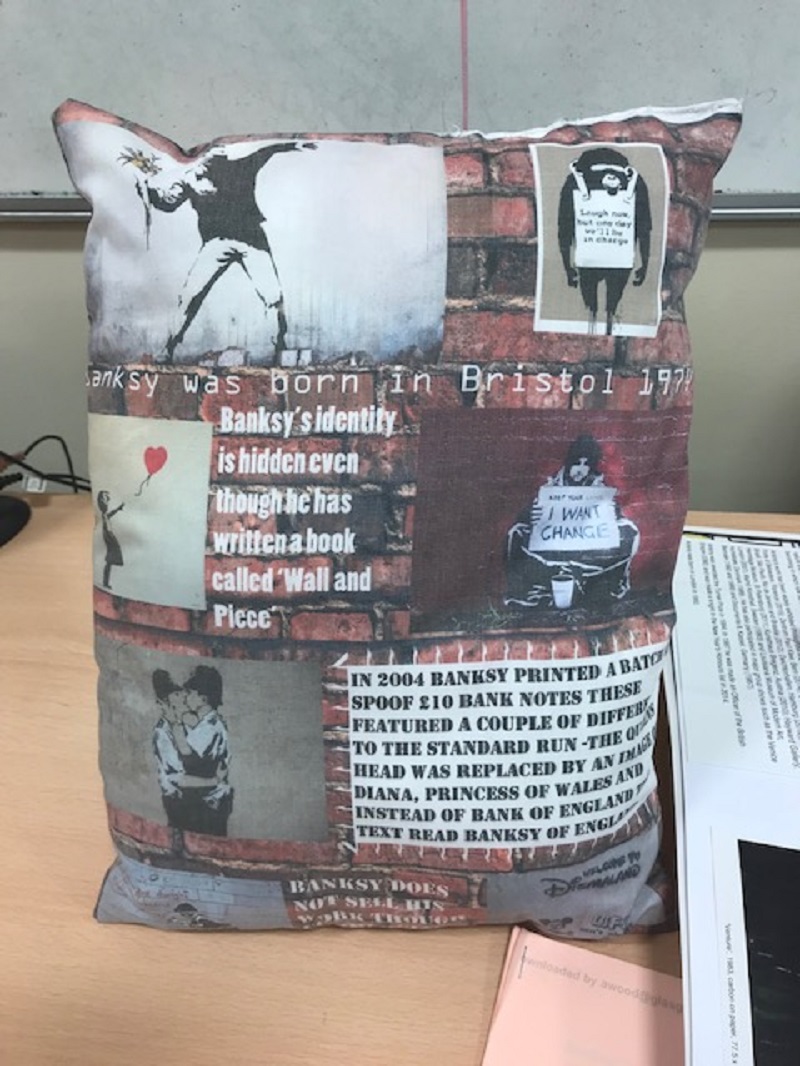
Arts Award and flexibility: young people achieving their first qualification
BY: Guest Writer
11 Mar 2019
Kibble Education and Care Centre is Scotland’s specialist provider of services for young people at risk. Based in Paisley, they run a secure school, an open school and also lead on a variety of enterprise projects under the banner ‘KibbleWorks’.
Sarah Longfield from See Think Make interviewed Laura Cairns, Head of Expressive Arts, in the open school and Sarah Falconer, Social Enterprise Co-ordinator and Leader of Textiles, in KibbleWorks to find out how the flexibility of Arts Award enables many of their young people to achieve their very first qualification.
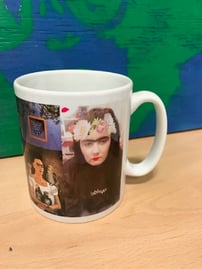 Why did you choose to deliver Arts Award?
Why did you choose to deliver Arts Award?
There are not many qualifications that suit the needs of our young people. Arts Award gives us the flexibility to work across the three different parts of our company: the safe centre, education and KibbleWorks. Some young people experience all of these settings, so being able to continue their Arts Award in different places is great.
When working in the open school, a lot of the SQA Nationals (equivalent to GCSE’s in England and Wales) don’t suit us. For example, in music, a young person might come to us in their fourth year having never played an instrument but if they wanted to complete National 4 or 5, they must be able to play two instruments. This puts too much pressure on them. We also have some young people who cannot cope in other subject areas, but have engaged well in expressive arts.
In the safe centre, Arts Award works well because some young people are there for relatively short periods of time, meaning they have a reduced range of subjects, but may see the art teacher three times a day, so this enables the teacher to focus on delivering Arts Award.
Arts Award is an integral part of our wider achievement programme. We’re not governed by timelines, unlike SQA which has set deadlines for assessment materials and exams - Arts Award enables us to start and finish whenever we want.
Tell us about the Arts Award projects you’ve delivered
We deliver Discover, Explore and Bronze levels and the young people have created work to a fabulously high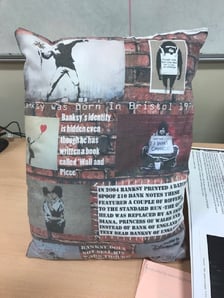 standard. One particularly memorable Arts Inspiration for Bronze (part C), was when a young person researched the life and work of the artist Banksy then printed what she found out onto fabric and turned it into a cushion (see image on the right)! She used the skills she’d learnt in Bronze Part A to present her findings for Part C.
standard. One particularly memorable Arts Inspiration for Bronze (part C), was when a young person researched the life and work of the artist Banksy then printed what she found out onto fabric and turned it into a cushion (see image on the right)! She used the skills she’d learnt in Bronze Part A to present her findings for Part C.
We have a printer that can easily print onto fabric so it’s great to be able to mix graphic design and textiles.
A lot of our young people who are engaged with music will also become engaged in art and drama, so we work across multiple art forms.
The Scottish Ballet also visits us every year, which many of the young people engage with. We’re lucky to be able to provide this opportunity for young people and to have professional artists visit us in our setting is certainly something that makes us unique.
What impact has delivering Arts Award had at Kibble?
The flexibility of Arts Award is what works at Kibble and its focus on the distance travelled for that individual, rather than reaching a certain academic bar. For example, one young person had never maintained concentration in the classroom to be able to gain a qualification, so achieving an Arts Award qualification was a first and really significant step for her.
Another young person really enjoyed meeting a glass artist who visited us. She told everyone about it and got far more out of it than we had anticipated. She struggles with confidence, so to see her interact so positively with the artist was amazing.
For one of our projects, the art teacher brought in some of her own art work. The teacher is very modest and wouldn’t normally show her work, but for those young people who were researching artists for their Explore Part B, to see that they were being taught by an artist was really powerful.
We have also received a lot of interest from other schools interested in our Arts Award work, so the word is spreading!
How did you celebrate your young people's Arts Award achievements?
We had a ‘KOSCARS’ ceremony, which was black tie and included a red carpet! This really helped raise the profile of Arts Award and was a great chance for the Expressive Arts department to show the rest of the school what Arts Award is all about and what young people can achieve.
Did you experience any challenges?
When we were working towards moderation, we realised how much work goes into making the portfolios robust. However, the moderator told us that we did more than we needed to, but it was our first time so we now know for next time.
Do you have any tips or advice for other Arts Award Advisers?
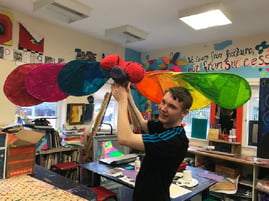 Ensure that you have a member of staff who is a trained Arts Award Adviser to collate photos and scribe for the young people if necessary.
Ensure that you have a member of staff who is a trained Arts Award Adviser to collate photos and scribe for the young people if necessary.
Now that we’ve had our first year of delivering Arts Award, we plan to work differently next time. We know one young person who has already completed two parts of her Bronze without knowing she had started! It does get easier after you’ve delivered for the first time.
We would also recommend that you get to know the artists based in your local area, as having artists visit your setting makes the experience more real for the young people. With the hook of Arts Award, we found it easier asking people to come in and talk about their life and work as an artist.
Related posts
BY: Guest Writer
BY: Alan Lynch

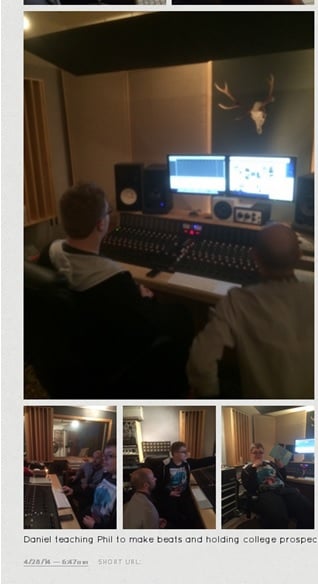
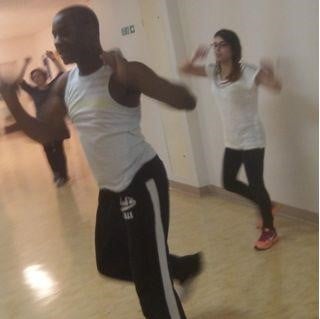
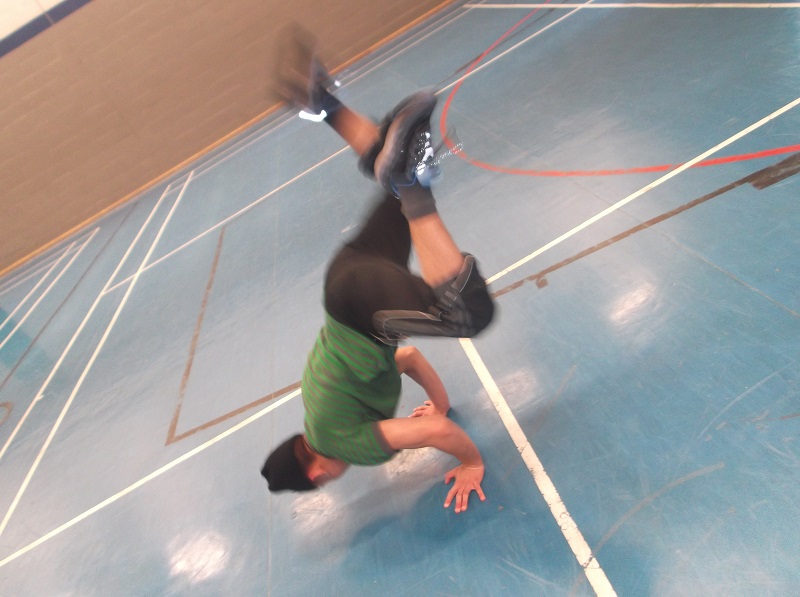
Comments & Replies